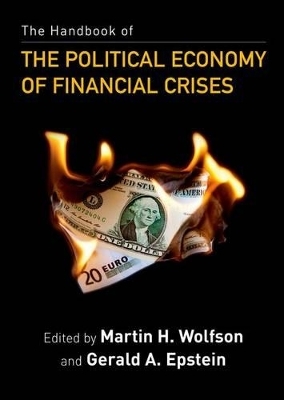
The Handbook of the Political Economy of Financial Crises
Oxford University Press Inc (Verlag)
978-0-19-024093-6 (ISBN)
The Great Financial Crisis that began in 2007 reminds us with devastating force that financial instability and crises are endemic to capitalist economies, and that it is only strong and dynamically-changing financial regulations that can keep the damage caused by these crises within bounds. The international financial system and individual national economies, including that of the United States, are suffering from the aftermath of the worst financial crisis since the Great Depression. Economists are struggling to understand the origins and implications of the crisis. The Handbook of the Political Economy of Financial Crises uses a political economy theoretical framework to analyze the crisis.
After an opening chapter that describes the dimensions of the current crisis, the next section provides relevant theoretical frameworks. Subsequent sections apply these theoretical frameworks to analyze the background, dimensions, and implications of the crisis for the world economy. Leading scholars push forward our understanding of how and why our international and domestic economies are susceptible to financial breakdown and what can be done to mitigate this problem in the future.
The methodology throughout applies theoretical concepts in the context of an historical and institutional understanding of the real world. By emphasizing the historical and institutional aspects of financial crises, the authors advance economic knowledge and provide insights into how we can manage our financial system to improve the lives of ordinary people.
Martin H. Wolfson is the Director of the Higgins Labor Studies Program. He teaches economics at the University of Notre Dame. Before teaching, he was an economist at the Federal Reserve Board in Washington, D.C. He is a member of the Board of Directors of the Community Forum for Economic Development, an organization that promotes social and economic equity and increased living standards of local residents. Gerald A. Epstein is Professor of Economics and a founding Co-Director of the Political Economy Research Institute at the University of Massachusetts Amherst. He is the co-founder of SAFER, a group of economists and other analysts who participate in the debate over financial reform in the United States.
Introduction ; 1. Gerald A. Epstein and Martin H. Wolfson ; PART I: THE GREAT FINANCIAL CRISIS: U.S. DYNAMICS AND EFFECTS ; 2. The Origins of the U.S. Financial Crisis of 2007: How a House Price Bubble, a Credit Bubble, and Regulatory Failure Caused the Greatest Economic Disaster Since the Great Depression. ; Marc Jarsulic ; 3. Speculation and Asset Bubbles ; Dean Baker ; 4. The Great Recession's Impact on Jobs, Wages, and Incomes ; Josh Bivens and Heidi Shierholz ; 5. Distribution and Crisis: Reviewing Some of the Linkages ; Arjun Jayadev ; 6. Housing Markets and Foreclosures ; Rachel Drew and Christian Weller ; PART II: THEORETICAL APPROACHES FOR UNDERSTANDING FINANCIAL CRISES ; 7. The Realism of Assumptions Does Matter: Why Keynes-Minsky Theory Must Replace Efficient Market Theory as the Guide to Financial Regulation Policy ; James Crotty ; 8. Political Economy Approaches to Financial Crisis: Hyman Minsky's Financial Fragility Hypothesis ; Jan Kregel ; 9. An Institutional Theory of Financial Crises ; Martin H. Wolfson ; 10. The Anatomy of Financial and Economic Crisis ; Duncan K. Foley ; PART III: THE GLOBAL DIMENSIONS OF FINANCIAL CRISES ; 11. The Economic and Financial Crisis of 2008-2010: The International Dimension ; Ajit Singh ; 12. Global Imbalances and the International Monetary System: Problems and Proposals ; Jane D'Arista and Korkut Erturk ; 13. How the Full Opening of the Capital Account to Highly Liquid and Unstable Financial Markets Led Latin America to Two and a Half Cycles of 'Mania, Panic and Crash' ; Jose Gabriel Palma ; 14. Financial and Currency Crises in Latin America ; Mario Damill, Roberto Frenkel and Martin Rapetti ; 15. The Asian Financial Crisis, Financial Restructuring and the Problem of Contagion ; C. P. Chandrasekhar and Jayati Ghosh ; 16. Speculation and Sovereign Debt - An Insidious Interaction ; Gerald Epstein and Pierre Habbard ; 17. Whither the Euro? History and Crisis of Europe's Single-Currency Project ; Robert Guttmann and Dominique Plihon ; 18. The Eurozone Crisis through the Prism of World Money ; Costas Lapavitsas ; PART IV: THE ROLE OF INSTITUTIONAL AND STRUCTURAL CHANGE IN THE DEVELOPMENT OF FINANCIAL CRISES ; 19. Changes in the Postwar Global Economy and the Roots of the Financial Crisis ; David M. Kotz ; 20. Bank Lending and the Subprime Crisis ; Gary Dymski ; 21. Deregulation and the New Financial Architecture ; Damon Silvers ; 22. What We Don't Talk About When We Talk About Banking ; Jennifer S. Taub ; 23. Derivatives in the Crisis and Financial Reform ; Michael Greenberger ; 24. From Innovation to Financialization: How Shareholder Value Ideology is Destroying the US Economy ; William Lazonick ; 25. Financialization and the Global Economy ; Engelbert Stockhammer ; 26. The International Spread of Financialization ; William K. Tabb ; PART V: POLICY AND INSTITUTIONAL CHANGE TO LIMIT FINANCIAL CRISES ; 27. International and Regional Cooperation for Dealing with Financial Crises ; Jose Antonio Ocampo ; 28. Productive Incoherence in a Time of Crisis: The IMF and the Resurrection of Capital Controls ; Ilene Grabel ; 29. The Japanese Boom and Bust: " Lessons ; Robert McCauley ; 30. The Role of the Federal Reserve: Lender of Last Resort ; Chris Rude ; 31. Monetary Policy and Central Banking after the Crisis: The Implications of Rethinking Macroeconomic Theory ; Thomas I. Palley ; 32. The Bailout of the "Too-Big-to-Fail" Banks: Never Again ; Fred Moseley ; 33. The Savings and Loan Crisis and Bailout: Lessons for Policy ; Dorene Isenberg ; 34. Pension Policies to Minimize Future Economic Crises ; Teresa Ghilarducci ; 35. A Minskian Road to Financial Reform ; Randall Wray ; 36. The Global Financial Crisis and Africa: The Effects and Policy Responses ; Zuzana Brixiova and Leonce Ndikumana ; 37. Beyond Capitalism? ; Minqi Li
| Erscheint lt. Verlag | 10.9.2015 |
|---|---|
| Verlagsort | New York |
| Sprache | englisch |
| Maße | 244 x 170 mm |
| Gewicht | 1293 g |
| Themenwelt | Sozialwissenschaften ► Politik / Verwaltung ► Politische Theorie |
| Sozialwissenschaften ► Politik / Verwaltung ► Staat / Verwaltung | |
| Wirtschaft ► Volkswirtschaftslehre ► Finanzwissenschaft | |
| Wirtschaft ► Volkswirtschaftslehre ► Wirtschaftspolitik | |
| ISBN-10 | 0-19-024093-8 / 0190240938 |
| ISBN-13 | 978-0-19-024093-6 / 9780190240936 |
| Zustand | Neuware |
| Haben Sie eine Frage zum Produkt? |
aus dem Bereich


